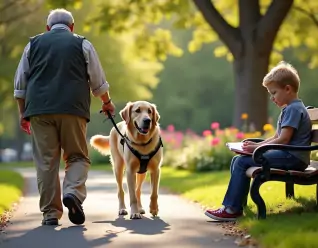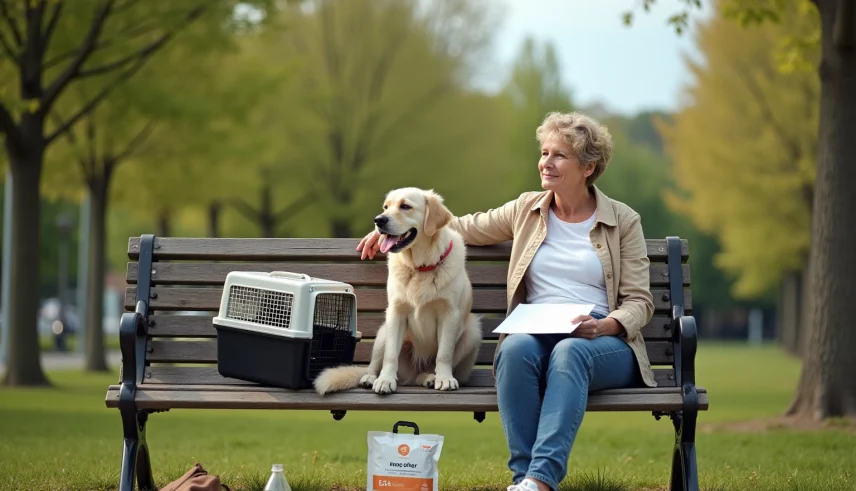
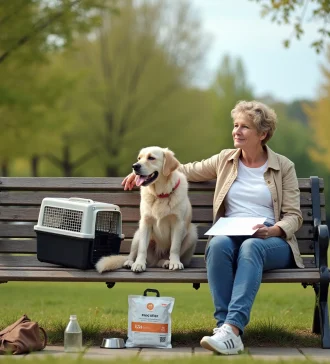
7 Tips for Traveling with Your ESA and Hotels
by Lena Park
Last updated: July 11, 2025
Verified and Approved by:
Angela Morris,
MSW, LCSW
Fact Checked

Overview
The article “7 Tips for Traveling with Your ESA and Hotels” offers heartfelt guidance for those traveling with emotional support animals (ESAs) and navigating hotel accommodations. It acknowledges the emotional challenges faced by individuals with mental health issues, emphasizing the importance of understanding legal rights and preparing necessary documentation.
By effectively communicating with hotel staff, travelers can ensure a smooth experience with their ESA. The article also provides insights on:
- Packing essentials
- Addressing the needs of both the traveler and their beloved animal
- Fostering a sense of connection and understanding throughout the journey
Introduction
Traveling with an emotional support animal (ESA) can be a deeply rewarding yet challenging journey. For many, the bond shared with their furry companions is vital for mental well-being.
However, navigating the complexities of pet-friendly accommodations and understanding legal protections can feel overwhelming. As airline policies and hotel regulations evolve, it raises important questions:
- How can travelers advocate for their ESAs while ensuring they meet varying requirements?
This article aims to provide essential tips for traveling with an ESA, offering valuable insights to enhance the travel experience for both the owner and their beloved animal. By acknowledging the emotional challenges faced by individuals with mental health issues, we can explore the profound benefits that an ESA brings, ultimately reassuring you that support is available every step of the way.
Wellness Wag: Obtain Your ESA Letter Quickly for Travel
At Wellness Wag, we understand the challenges that come with mental health struggles, especially when it comes to traveling with your emotional support animal and finding ESA and hotels. The process of obtaining your ESA document can feel overwhelming, but we offer a quick and efficient solution that prioritizes your needs.
It all starts with a brief assessment to determine your eligibility, followed by a personalized consultation with licensed mental health professionals who are dedicated to evaluating your unique situation. Once authorized, you can expect to receive your official ESA document within 24 hours, allowing you to make timely travel arrangements.
However, for those living in states with specific regulations, we kindly ask for your patience, as it may take up to 30 days due to legal requirements (AR, CA, IA, LA, MT). This swift turnaround is particularly beneficial for those last-minute plans, enabling pet owners to embark on their journeys with confidence, knowing they have the necessary documentation in hand.
In fact, approximately 88% of ESA requests are processed within this timeframe, highlighting the efficiency of Wellness Wag’s services. Our mental health experts emphasize that having an ESA and hotels during your travels can significantly reduce anxiety and enhance your overall well-being, making the experience more enjoyable for both you and your beloved companion.
It’s also important to remember that some landlords may require yearly confirmation of your ESA documents, so staying informed about your paperwork needs is essential. We invite you to schedule your consultation today to ensure your travel arrangements are seamless.
After placing your order, you will receive a confirmation email detailing your purchase, keeping you informed every step of the way. Discover the effortless path to obtaining your legitimate ESA letter with Wellness Wag by taking our quick assessment to share your situation and emotional support needs.
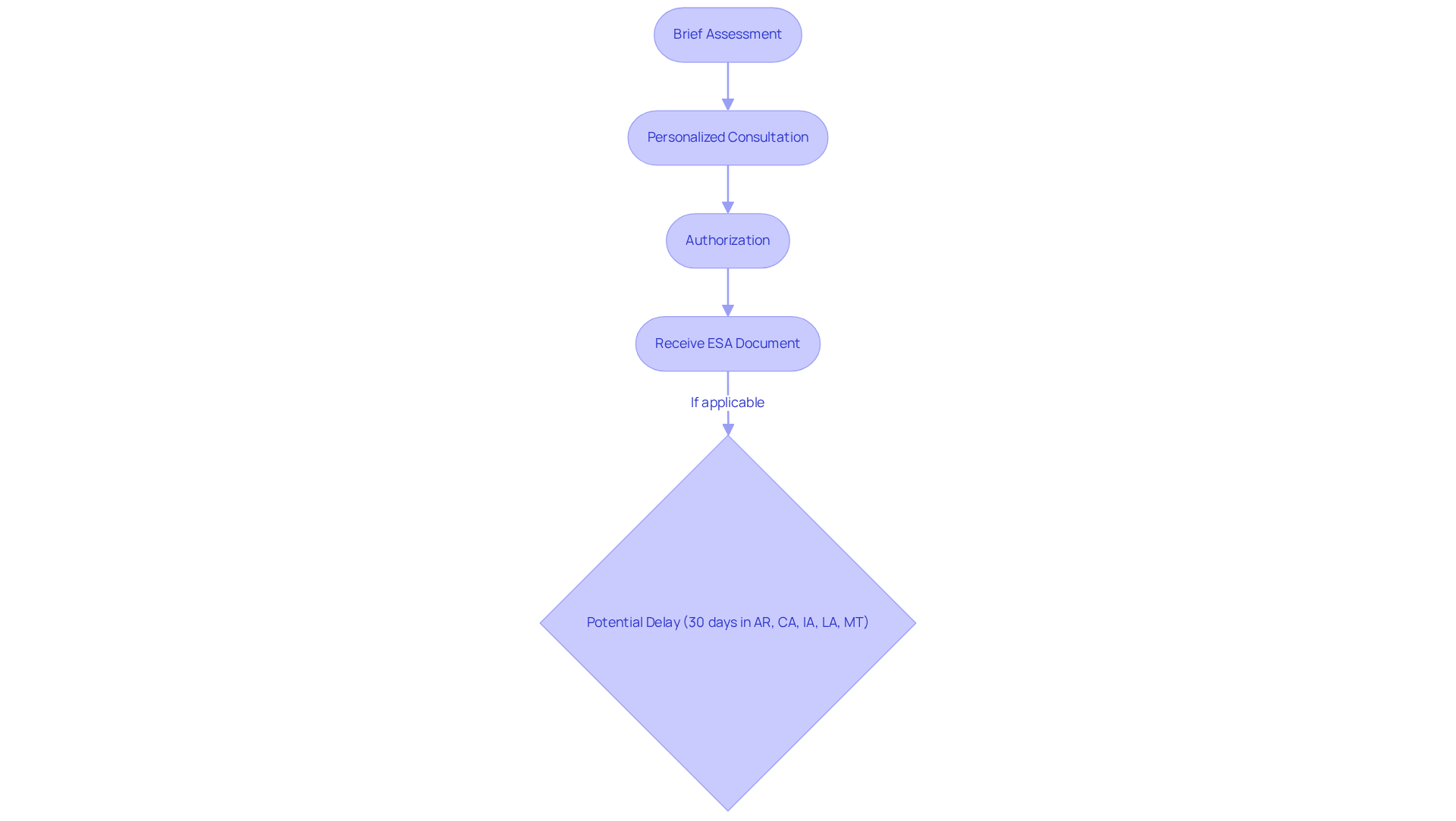
Know Your Rights: Legal Protections for ESA Travelers
Travelers with emotional support animals (ESAs) experience significant legal protections under the Fair Housing Act (FHA) and the Air Carrier Access Act (ACAA). The FHA allows individuals to live with their ESAs in places that typically prohibit pets, ensuring that those facing mental health challenges can maintain their vital connections with these companions. Likewise, the ACAA requires airlines to allow ESAs to travel in the cabin with their handlers, provided they present the necessary documentation.
It is crucial for ESA owners to understand these rights to effectively advocate for their needs while traveling. Holding a valid ESA letter is essential; this document must be issued by a licensed mental health professional and confirm the need for the animal’s presence due to a mental health-related disability. In fact, many ESA travelers report that they consistently carry their ESA letters to prevent complications during their journeys.
When engaging with hotel staff or airline personnel, being prepared to discuss your rights can lead to smoother experiences. For example, under the ACAA, airlines must allow ESAs in the cabin, although they may require documentation to verify the animal’s status. Furthermore, the FHA protects ESA owners from discrimination in housing, allowing them to live with their pets without facing pet bans or additional fees.
Understanding these legal protections not only empowers ESA owners but also enhances their travel experiences, ensuring they can enjoy the companionship of their pets in ESA and hotels across various accommodations. To optimize your travel experience, make sure your ESA letter is current and meets legal standards. As Linda S. shared, “Applying for an ESA through Wellness Wag was the best decision I made. It was an effortless process and the team was very professional.
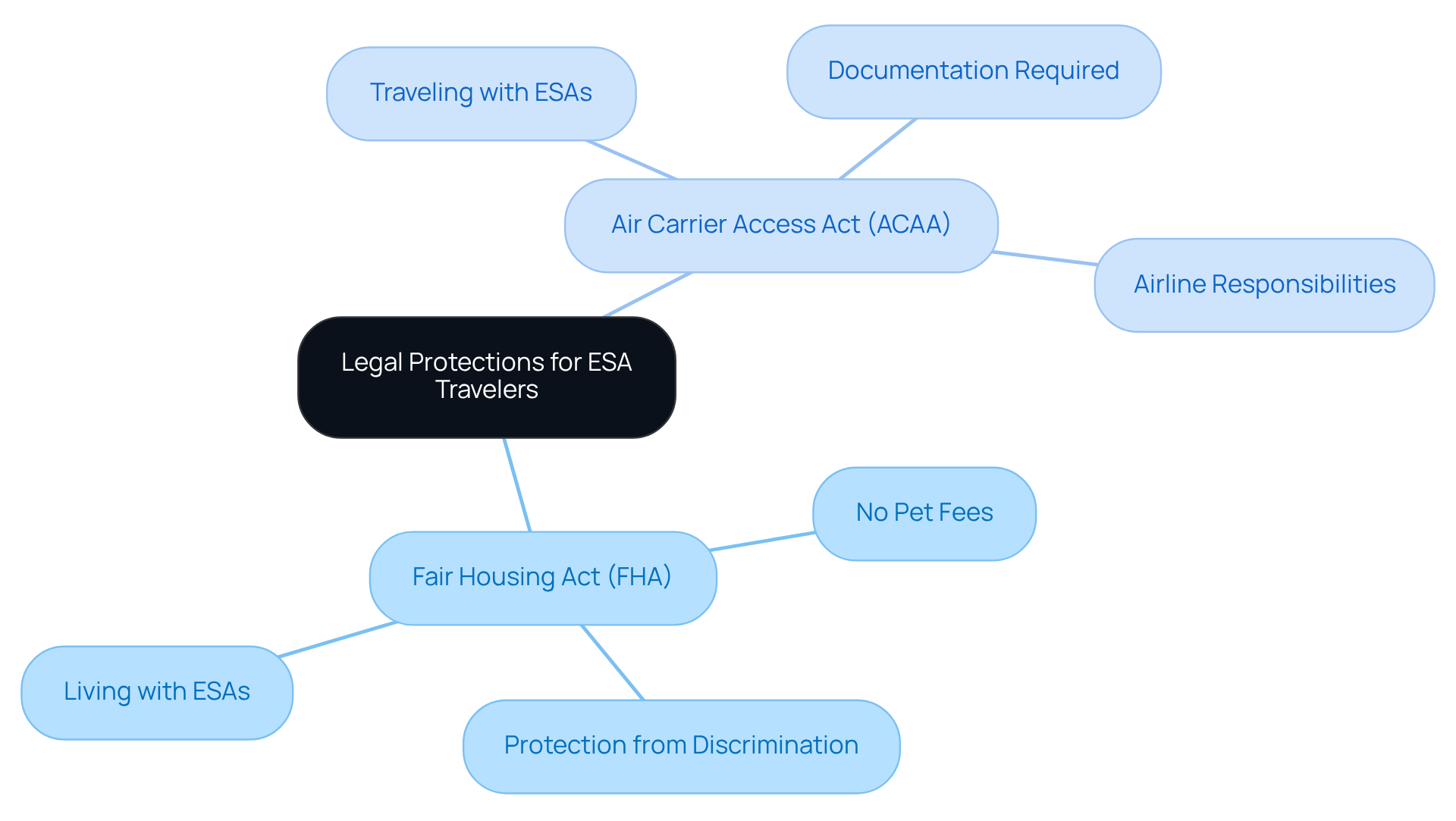
Research Pet-Friendly Hotels: Policies and Requirements
Before you reserve your accommodation, it’s important to consider the emotional challenges that come with traveling with a beloved pet. Investigating ESA and hotels along with their specific regulations regarding emotional support animals can feel overwhelming. Some hotels may impose restrictions on the size or breed of pets, and others might require additional documentation. This can add to the stress of planning your trip.
Websites like BringFido or the hotel’s official site can provide valuable information to ease your worries. However, to ensure you have the most accurate and up-to-date information, it’s always best to contact the hotel directly. Confirming their policy regarding ESA and hotels can help you feel more secure and ensure a hassle-free check-in experience.
Remember, you’re not alone in navigating these challenges. Many individuals face similar concerns, and seeking out the right support can make all the difference. By taking these steps, you can create a more comfortable and enjoyable travel experience for both you and your emotional support animal.
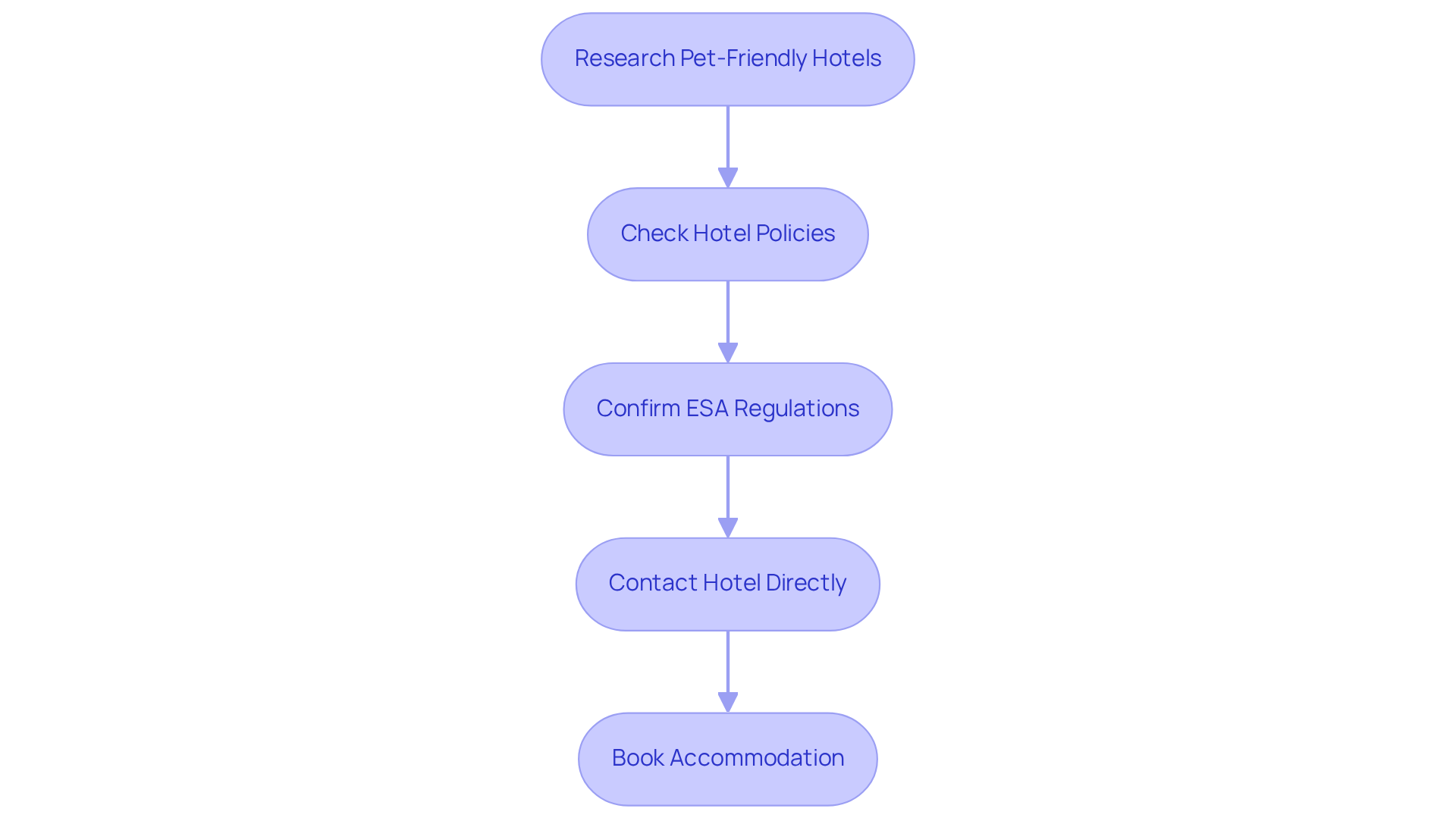
Pack Essentials: Gear for You and Your ESA
When traveling with your emotional support animal (ESA) and hotels, packing the right essentials is vital for a smooth journey. Begin with a comfortable carrier that meets Air Canada’s size guidelines, along with a sturdy leash to ensure your ESA’s safety during transit. Don’t forget to bring food and water bowls, as well as enough food to last throughout your trip. It’s also crucial to include any medications your ESA may need.
Comfort items play a significant role in helping your ESA adjust to new environments. A cherished blanket or toy can provide a sense of safety, alleviating anxiety during your travels. Veterinarians agree that familiar objects can significantly reduce stress for animals in unfamiliar surroundings, enhancing their overall journey experience. In fact, 88% of ESA owners report a positive mental health impact from their companions, highlighting the importance of ensuring comfort during travel.
Additionally, consider packing:
- Waste bags for easy clean-up
- A portable water bottle to keep your ESA hydrated
It’s important to remember that Air Canada no longer recognizes emotional support pets, making it essential to have the proper documentation, such as a U.S. DOT form and a suggested PSD document, to meet legal requirements for traveling with your pet. This preparation is key to ensuring a successful journey for both you and your beloved companion.
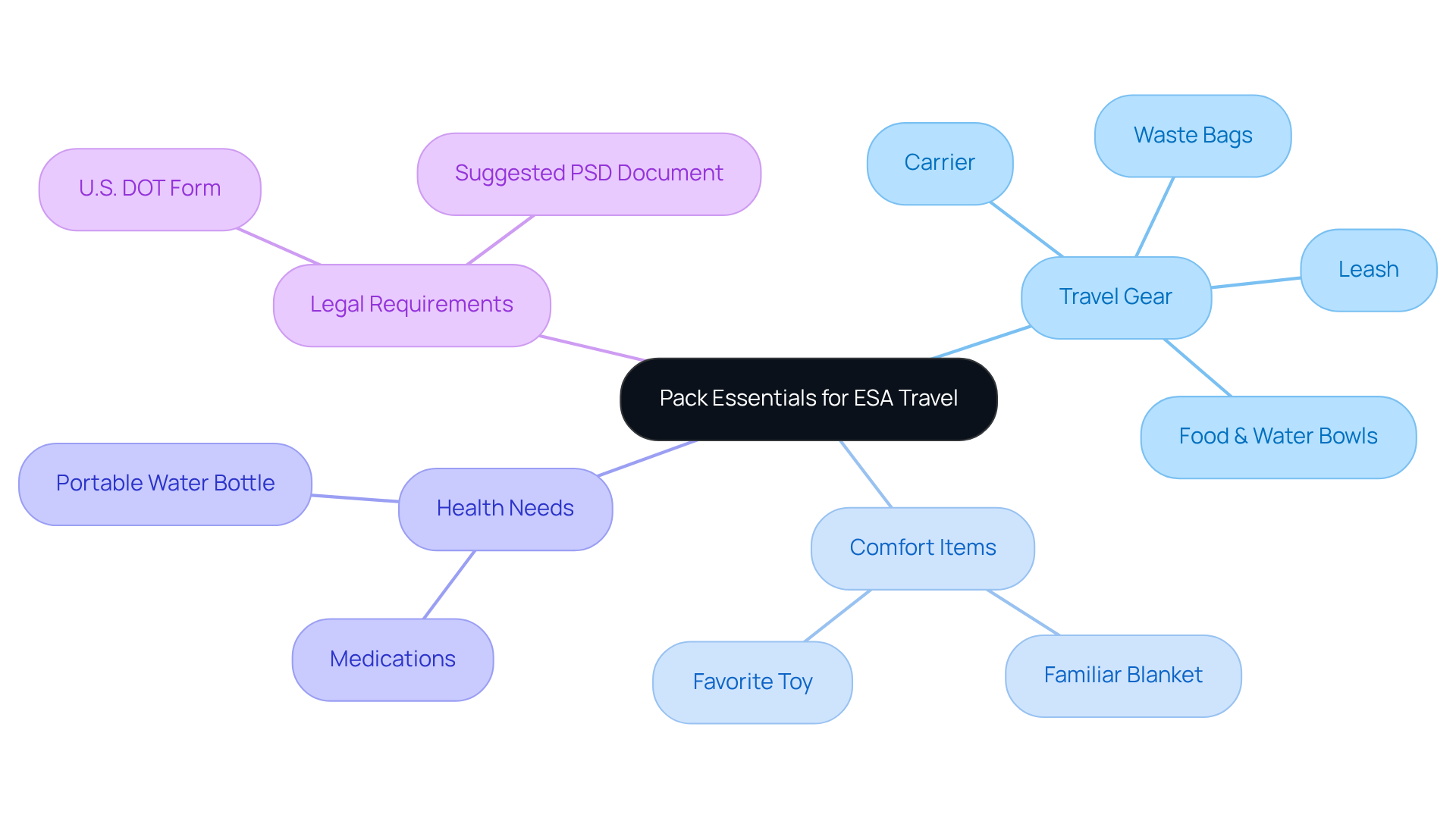
Communicate with Hotel Staff: Ensure ESA Acceptance
When you arrive at your hotel, it’s important to communicate effectively with the staff regarding your emotional support companion (ESA). Start by presenting your ESA document, which serves as formal proof of your need for the pet. Clearly articulate your requirements and the role your ESA plays in supporting your mental health. This approach not only alleviates any concerns the staff may have but also nurtures a more accommodating atmosphere.
Consider sharing a brief overview of how your ESA contributes to your well-being. Mental health professionals often highlight the significance of transparency in these interactions, as it can lead to a more understanding response from hotel staff. Many hotels are increasingly recognizing the importance of training regarding ESA and hotels, which enhances their ability to support guests with emotional needs.
Successful interactions often rely on politeness and clarity. Guests who have effectively communicated their needs frequently report positive experiences, with hotel staff being more willing to make accommodations. Always remember to maintain a respectful demeanor, as this can greatly influence the outcome of your request. By presenting your ESA letter and thoughtfully articulating your needs, you can help ensure a smoother experience during your stay.
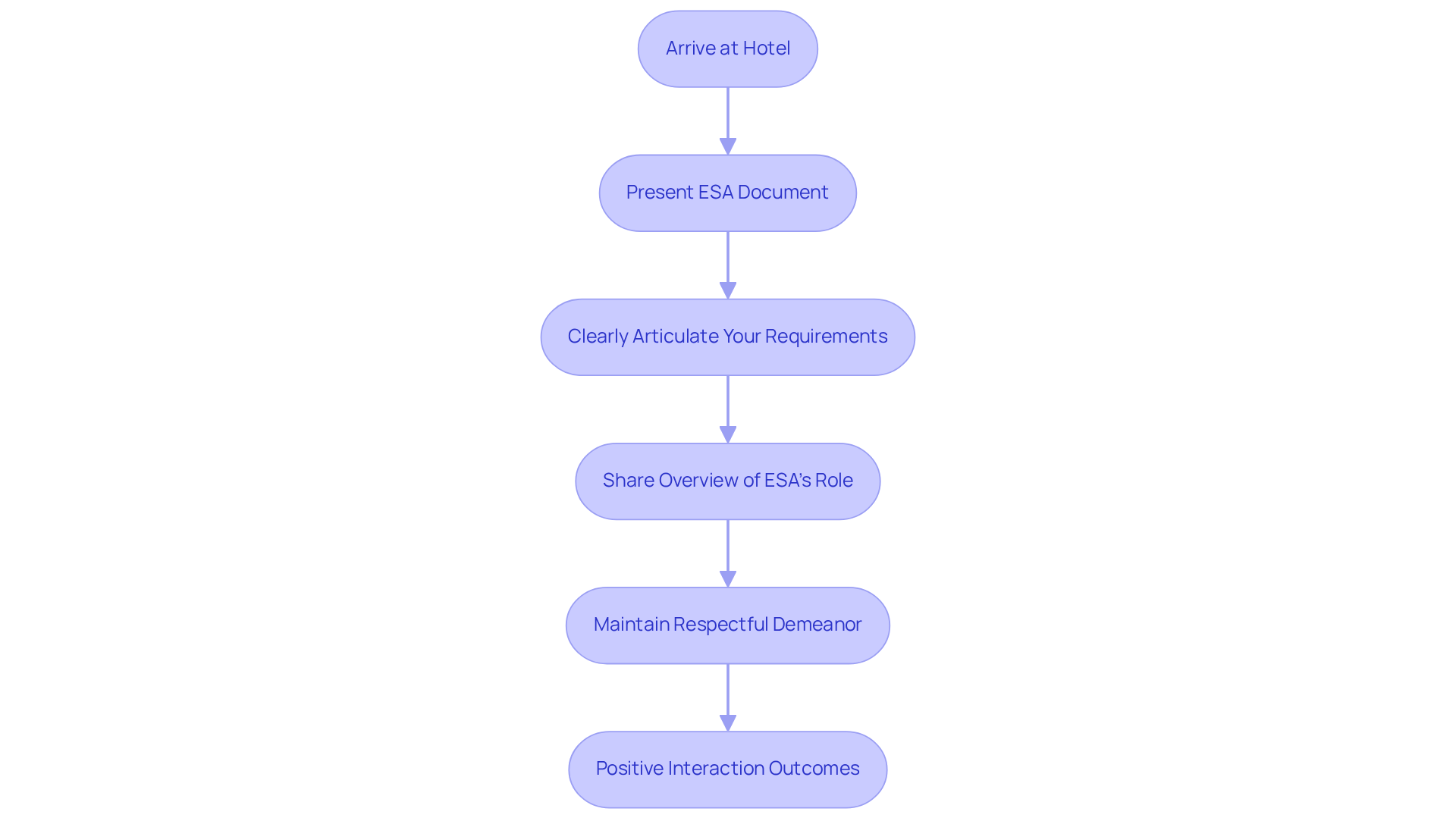
Address Your ESA’s Needs: Comfort and Care During Travel
Traveling can be a challenging experience for both you and your emotional support companion, especially when considering ESA and hotels. It’s important to recognize the emotional hurdles that come with travel. To ensure your ESA remains comfortable, maintaining a consistent routine throughout your journey is essential. This includes:
- Regular feeding times
- Scheduled bathroom breaks
These can help alleviate anxiety. Bringing familiar items, such as a favorite blanket or toy, can provide additional comfort and a sense of security for your ESA.
Monitoring your ESA’s behavior is crucial; be attentive to any signs of stress, such as excessive panting or restlessness. Adjust your plans as necessary to accommodate their needs, whether that means taking more frequent breaks or finding quieter spaces. As behavior specialists suggest, keeping a schedule is vital for ESAs, as it helps them feel secure and reduces the chances of stress-related issues during journeys.
Additionally, consider reaching out to hotels or property managers directly to inquire about their policies regarding ESA and hotels. This proactive approach can help avoid surprises and lead to recommendations for ESA-friendly activities. Always bring your ESA documentation to confirm your pet’s status if necessary, as this paperwork is essential for your travels.
For flights with Air Canada, please note that they no longer acknowledge emotional support animals; however, psychiatric service dogs can accompany you with the proper documentation, including a U.S. DOT form and a recommended PSD letter for smooth check-in. Also, be mindful of potential costs associated with staying in hotels with ESA, as policies can vary significantly, including fees or restrictions based on flight type. By prioritizing your ESA’s comfort and well-being, you can create a more enjoyable journey for both of you.
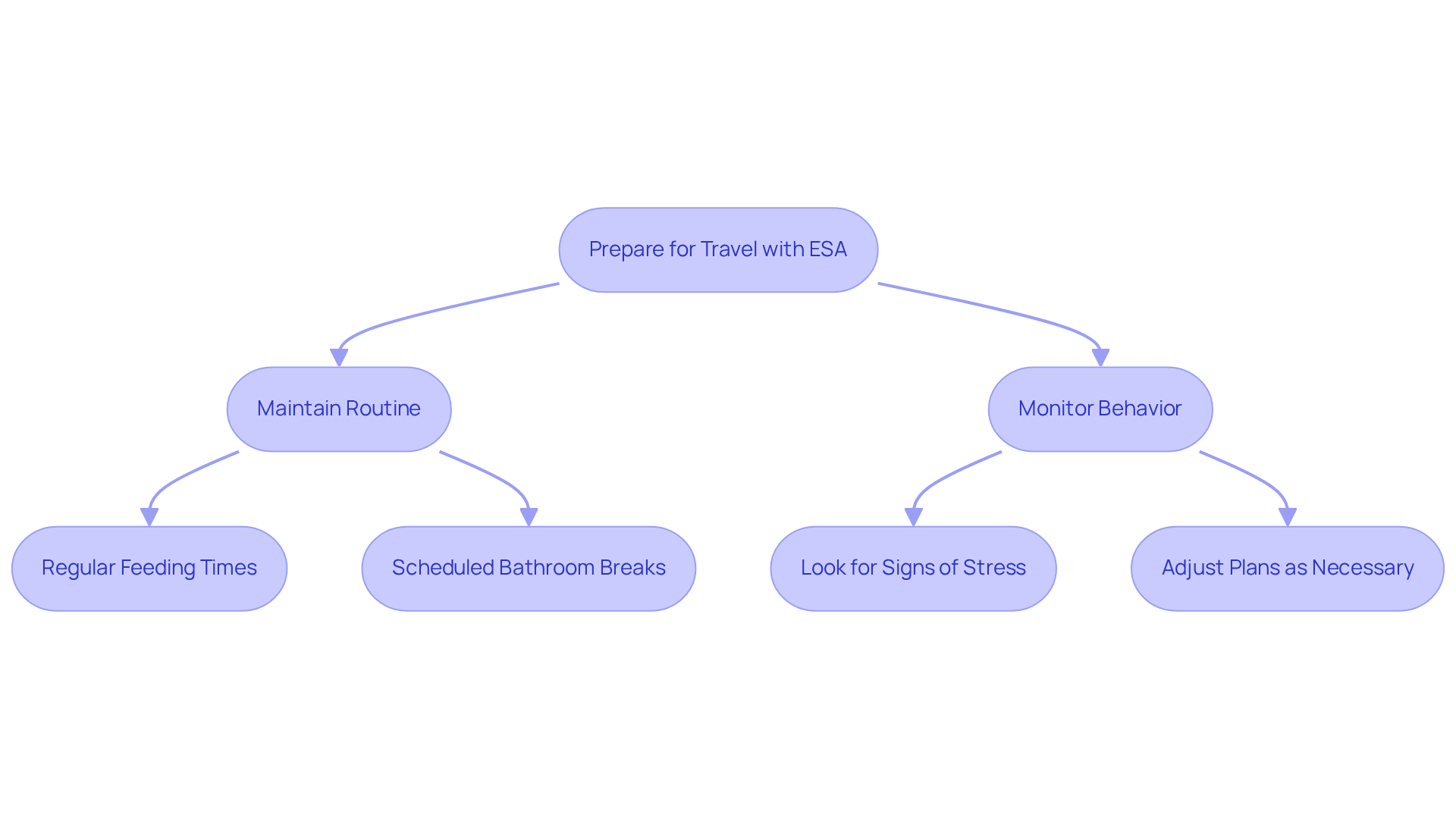
Understand Travel Restrictions: Airlines and Other Transport
Navigating the complexities of airline policies for emotional support animals (ESAs) can indeed feel overwhelming. With regulations differing widely among carriers and frequently changing, it’s understandable to feel uncertain. As we move into 2025, many airlines have adjusted their policies, often equating ESAs with pets. This shift means that owners might face pet travel fees, which can add to the stress of travel. Therefore, it’s essential to check the specific airline’s website for the latest regulations before booking your flight. Some airlines may require advance notice and specific documentation from licensed healthcare professionals, while also imposing size and breed restrictions for pets in the cabin.
Consider the significant rise in ESA registrations—up by 50% over the past five years. This surge reflects a growing acknowledgment of the mental health benefits associated with ESAs, as approximately 18% of pet owners in the U.S. now rely on these cherished companions for emotional support. However, incidents involving ESAs on flights, including behavioral challenges, have prompted airlines to tighten their regulations. In 2024 alone, airlines reported 13 animal incidents during transport, underscoring the importance of safety.
To ensure your journey is as smooth as possible, it’s vital to familiarize yourself with the airline’s specific requirements. This may involve obtaining an ESA letter from a licensed healthcare professional, a crucial step for qualifying for accommodations under the Fair Housing Act and the Air Carrier Access Act. Additionally, reaching out to aviation industry experts can provide you with valuable insights on the latest ESA regulations, helping you navigate these complexities with confidence. By staying informed and prepared, you can alleviate potential challenges when traveling with your ESA, ensuring that both you and your companion can enjoy a supportive and caring travel experience.
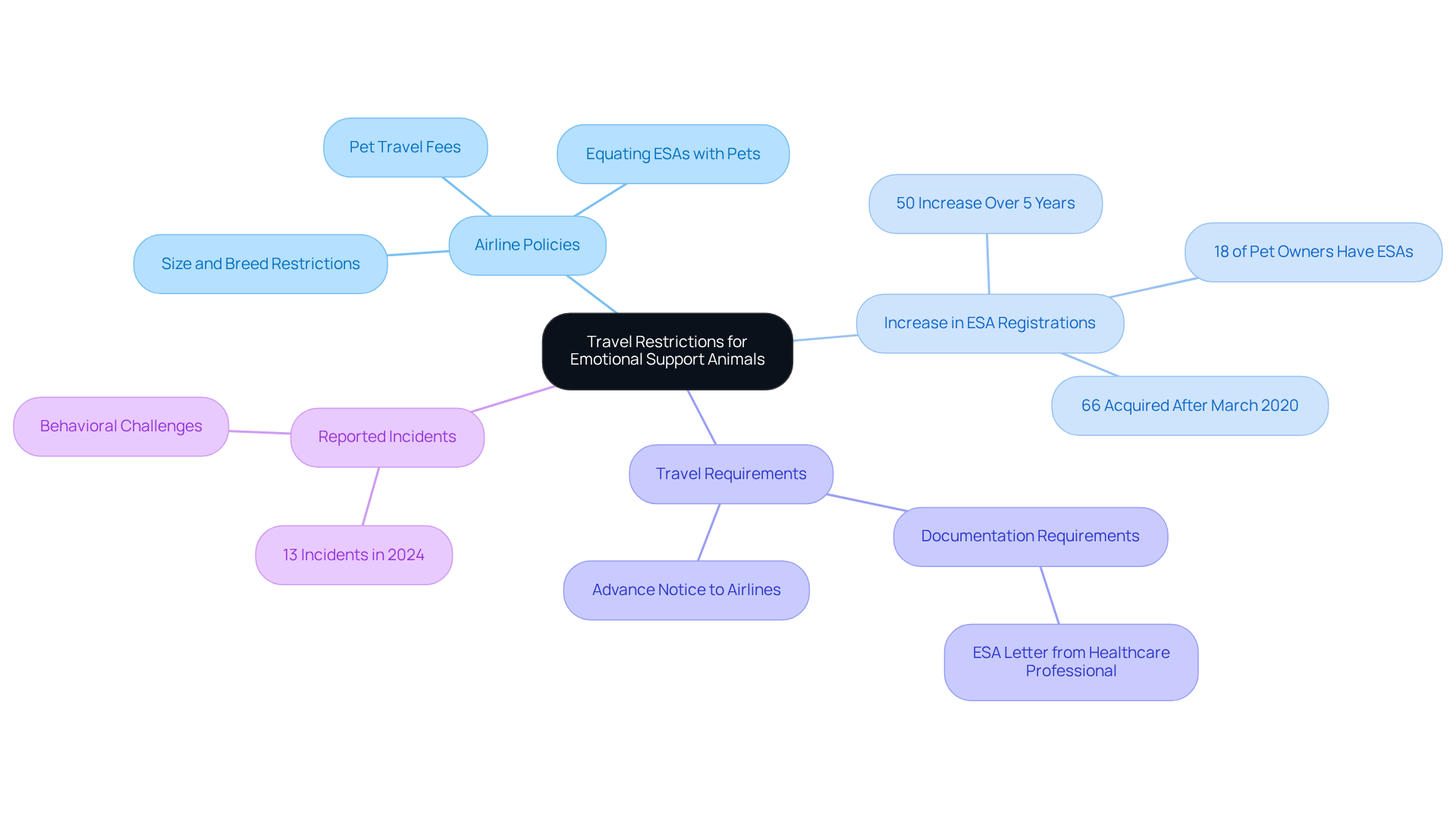
Create a Backup Plan: Prepare for Travel Emergencies
Travel can be unpredictable, and this uncertainty can be particularly challenging when you’re accompanied by your Emotional Support Animal (ESA). It’s important to have a comprehensive backup plan in place for emergencies.
Begin by identifying nearby veterinary clinics at your destination; knowing where to seek prompt medical attention can provide peace of mind if your ESA requires care.
Additionally, compiling a list of pet-friendly accommodations, such as ESA and hotels, ensures that you have alternatives ready, should your original plans fall through.
A well-stocked first-aid kit designed specifically for your ESA can also be invaluable, allowing you to address any minor injuries or health issues that may arise during your journeys.
Furthermore, remember to complete a U.S. DOT form and notify the Medical Assistance Desk at least 48 hours before your flight to comply with Air Canada’s policies.
Being prepared can significantly enhance your travel experience and ensure the well-being of your beloved companion.

Post-Travel Care: Help Your ESA Adjust After the Trip
After your trip, it’s essential to give your Emotional Support Animal (ESA) ample time to readjust to their home environment. Establishing a consistent routine is crucial for helping them feel secure and comfortable. As you monitor their behavior, be attentive to any signs of stress or anxiety, such as excessive barking, hiding, or changes in appetite. Providing extra comfort and attention during this period can significantly ease their transition.
Engaging in familiar activities, such as regular walks, playtime, or even simple grooming sessions, can help your ESA reconnect with their normal routine. For instance, a dog that enjoys daily walks may benefit from resuming this activity as soon as possible, as it not only provides physical exercise but also reinforces their sense of stability. Statistics show that individuals with secure attachments to their pets have 25% lower anxiety levels than those without pets, highlighting the importance of these routines.
Veterinarians stress the significance of routine for ESAs following journeys. According to Dr. Emily Carter, a veterinarian specializing in animal behavior, “Animals thrive on predictability. After a change in environment, returning to their usual schedule can help alleviate anxiety and restore their sense of normalcy.”
Real-life examples illustrate this point: many pet owners have reported that their dogs, after a trip, responded positively to familiar toys or treats, which helped them feel more at home. Additionally, creating a quiet space where your ESA can retreat and relax can further support their emotional well-being. For example, one owner noted that their dog calmed down significantly after being given a favorite blanket and toy upon returning home.
In summary, prioritizing routine and familiar activities is key to helping your ESA readjust after travel, ensuring they feel safe and secure in their environment once again. This care not only benefits the ESA but also helps mitigate panic attacks and improve mood for individuals suffering from depression.
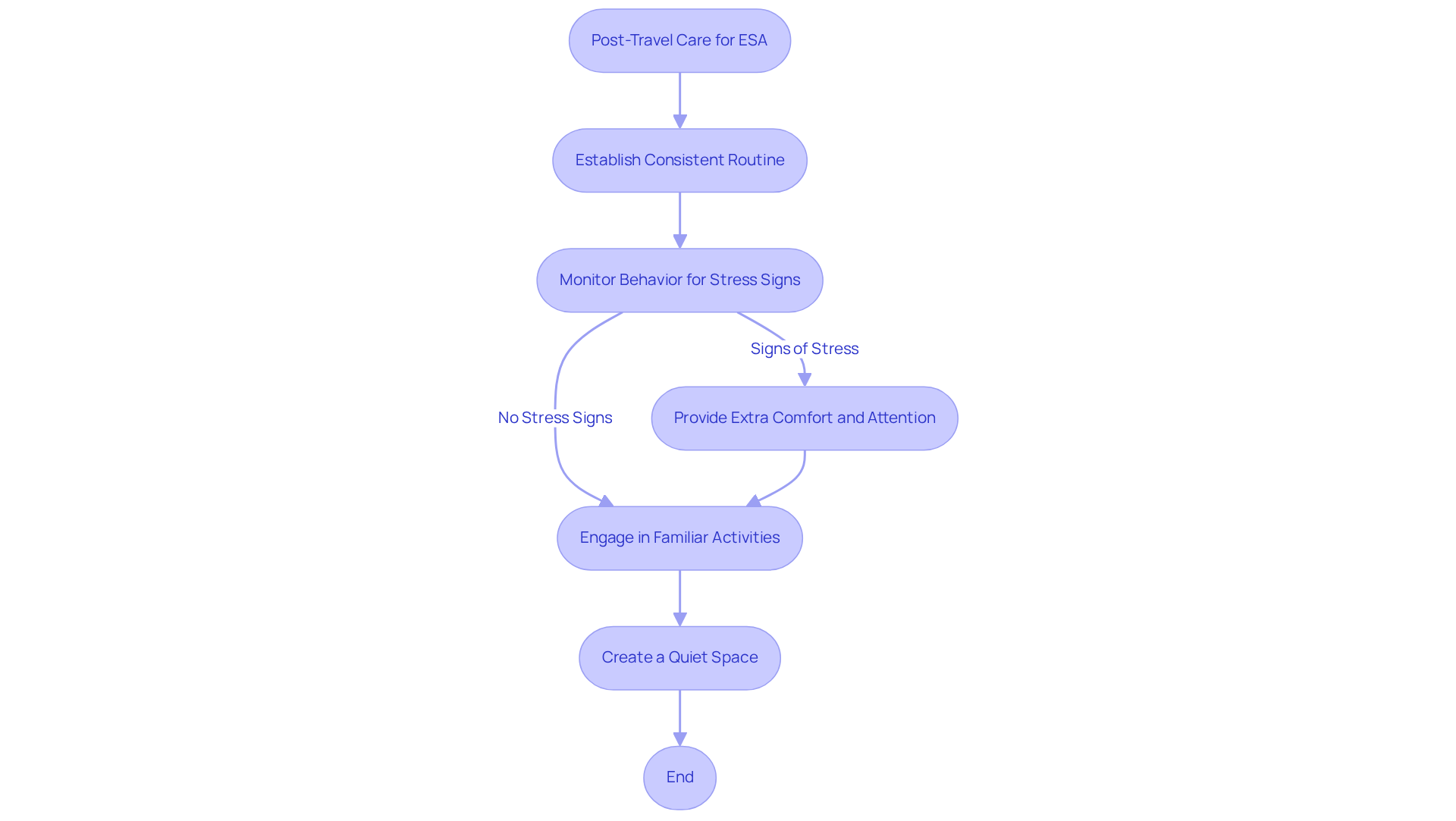
Consider Pet Insurance: Financial Protection for Travel
Traveling with an emotional support animal (ESA) and hotels can sometimes lead to unexpected health issues, which may add to the stress of your journey. Have you ever worried about what might happen if your ESA and hotels are not equipped to handle medical attention while you’re away from home? This concern is completely valid.
To ease your mind, consider investing in pet insurance. This can provide you with financial protection in case your beloved ESA needs medical care while you are traveling and staying at hotels. By researching different insurance plans, you can find one that best suits your needs and offers coverage for travel-related incidents.
Taking this proactive step can help you feel more secure and allow you to focus on enjoying your trip, knowing that support is available when you need it most.
Conclusion
Traveling with an emotional support animal (ESA) can bring immense joy, yet it also presents unique challenges. It’s essential to understand the steps needed to secure your ESA letter, know your legal rights, and prepare thoroughly for your journey. By prioritizing the comfort and well-being of both yourself and your ESA, you can cultivate a more enjoyable travel experience.
Key insights from this article highlight the importance of:
- Swiftly obtaining a valid ESA letter
- Understanding the legal protections available to ESA travelers under the Fair Housing Act and the Air Carrier Access Act
- Researching pet-friendly hotels and their specific policies
- Packing essential items for your ESA
- Effectively communicating with hotel staff
Being prepared for emergencies and providing post-travel care are also vital elements that contribute to your ESA’s comfort and adjustment.
Ultimately, your journey with your emotional support animal should be filled with companionship and comfort. By staying informed about travel restrictions, advocating for your rights, and proactively preparing for your travels, you can navigate the complexities of traveling with your ESA with confidence. Embrace the chance to explore new places while ensuring that both you and your beloved companion feel secure and supported throughout your adventures.
Frequently Asked Questions
What is the process to obtain an ESA letter through Wellness Wag?
The process begins with a brief assessment to determine eligibility, followed by a personalized consultation with licensed mental health professionals. Once authorized, you can expect to receive your official ESA document within 24 hours, although it may take up to 30 days in certain states due to legal requirements.
How quickly can I receive my ESA letter?
Generally, you can receive your ESA letter within 24 hours after authorization. However, in states with specific regulations (like AR, CA, IA, LA, MT), it may take up to 30 days.
What are the legal protections for ESA travelers?
ESA travelers are protected under the Fair Housing Act (FHA) and the Air Carrier Access Act (ACAA). The FHA allows individuals to live with their ESAs in housing that typically prohibits pets, while the ACAA requires airlines to allow ESAs in the cabin with their handlers, given they have the necessary documentation.
Why is it important to have a valid ESA letter?
A valid ESA letter, issued by a licensed mental health professional, is essential for confirming the need for the animal’s presence due to a mental health-related disability. It helps prevent complications during travel and ensures compliance with legal requirements.
How can I ensure a smooth travel experience with my ESA?
To ensure a smooth experience, carry your ESA letter for verification when engaging with hotel staff or airline personnel. Additionally, stay informed about your rights under the FHA and ACAA, and confirm hotel policies regarding ESAs before your trip.
What should I consider when researching pet-friendly hotels?
When researching pet-friendly hotels, check their specific regulations regarding emotional support animals, as some may have restrictions on size or breed and may require additional documentation. It is advisable to contact the hotel directly for the most accurate and up-to-date information.
How can Wellness Wag help with the ESA documentation process?
Wellness Wag offers a streamlined process to obtain your legitimate ESA letter, starting with a quick assessment to share your situation and emotional support needs, followed by a consultation with mental health experts. They prioritize your needs and keep you informed throughout the process.
Certify Your Emotional Support Animal Today

Why You Can Rely on Us?
At Wellness Wag, we believe your pet deserves care rooted in both science and compassion. Each article is carefully researched, written in clear language for pet owners, and then reviewed by qualified professionals to ensure the information is evidence-based, current, and practical for real-life care. Our goal is to help you feel confident in making informed decisions about your pet’s health and well-being.
Reviewed by
Angela Morris, MSW, LCSW
Angela is a licensed clinical social worker with 20 years of experience in patient advocacy and community mental health. She has assisted numerous clients with ESA evaluations and brings a deep understanding of disability accommodations, ensuring that all information is accurate, supportive, and practical.

Written by :
Lena Park
Last Updated :
July 11, 2025








